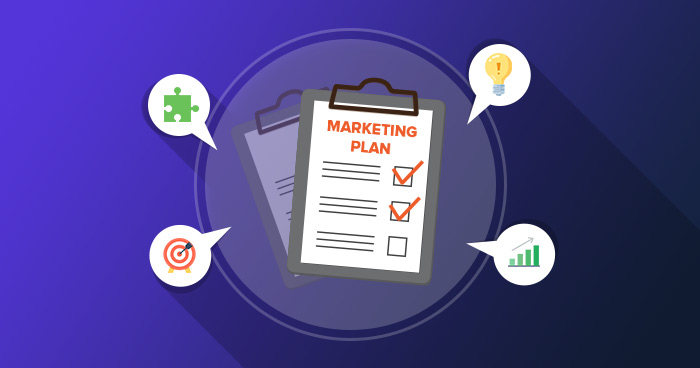
No business can grow without a proper marketing plan and startups are no different. A startup marketing strategy outlines a startup’s direction and approach to reach its goals. In practical terms, a sound marketing plan acts as a road-map to the success of the startups.
Need for a Startup Marketing Plan

A marketing plan is comprised of strategies for promoting startup products and services. While there is no set template, generally, it includes a checklist that is often the starting point of the marketing process.
A marketing plan helps startups identify potential customers, channels, and the ways that the marketing efforts can target them. In fact, the growth of the business is dependent on a solid startup marketing plan and requires timely planning. For practical purposes, a marketing plan for startups is an extensive strategy that helps them in:
- Evaluating the effectiveness of startup marketing strategy
- Clearing up the position and stance of services and products in the market
- Knowing customers and competitors
- Describing business and its products and services
- Recognizing and employing various marketing approaches
Elements of a Startup Marketing Plan
After reviewing a dozen marketing plan case studies of startups, we have come up with a marketing plan outline that can help you get your business off the ground fast and easy.
Identify Customers
First of all ask yourself and your team, who are you going to serve. As Simon Sinek says, start with WHY before going towards HOW. Identify your customers and then make a marketing plan for them. You should know that there are multiple other startups selling almost the same product as yours. So, what edge do you have? First, you have to identify which category of consumers you are targeting. A detailed description of these categories would make your efforts worthwhile. Describe the target customer in detail just to have a clear understanding of what you’re trying to achieve.

For example:
For an ecommerce store selling yoga pants, here is the sketch of a buyer’s persona.
Age: 18 to 28
Female
Interest: Athletics, Gymnastics, Fitness, Yoga, Exercise
Lives: Australia
Education: University, College
Goals: Become attractive and slim
Buying Power: $10 to $50
Pain Points:
- Don’t have time to buy fitness gear and clothing from local stores
- Wants to become slim faster
- Looking for compression pants that help lose weight and gain muscles
Track Buyer Journey
Once you have a sense of the buyer’s persona, start tracking the buyers to get more insights and information about them. This will reveal the future focus of your startup’s marketing. You must develop lucid and action-oriented insights into how you can grow your business further. That’s why it is important to track the buyer journey through various tools and plugins.
For example, if your product is digital you can track the buyer’s journey through analytics tools. Google Analytics is one as it offers a wide variety of tracking options.

Stand Out From the Competition
The only way you can differentiate yourself from the competition is by leveraging your uniqueness. A core part of a marketing plan for startups is to get a strong competitive advantage by implementing features that other competitors are not providing. Search forums, social media, and other places to find out what your competitor’s customers are looking for and develop those features within your product.
Once you have leveraged them, market the features within the same places so those potential customers know that you are providing these features and they come to you. This can be your strongest competitive advantage. A simple yet comprehensive statement of how you will meet your customer’s needs while edging out the competition can do wonders for you. The positioning statement with a target-oriented approach to solving problems is better than a wayward vision.
Include Niche-Specific Marketing Ideas
Every entrepreneur who is trying to start his business from the scratch up should find a way to provide business with a competitive advantage. One of the most important ways to give a business that competitive edge is to find a niche where the business can best use its skills and become the dominant player in that market segment.
Finding a niche is hard but not impossible and creating that niche should be the goal of the business, not the starting point. Because they will only be able to realize it by knowing the market in which their business operates in, where those lucrative gaps in the market are and how their business can take advantage of those niches.
In summary:
- Look for emerging trends
- Think of something you need yourself that is not available or easily accessible
- Play around with innovative technology
- Learn and explore new opportunities
- Come with innovative solutions to solve a problem
- Make sure that the startup marketing plan
Identify Marketing Channels (but select profitable ones)
When starting out you will focus on multiple channels but after a few months of trial and error, make sure that you have identified a few channels that work.
According to Forbes:
Among the hundreds of marketing channels out there (PR, influencers, events, digital, podcasts, print, newsletters, partnerships etc), it’s important to pick the ones that will work the hardest for you for the smallest amount of money. A good marketing plan starts with placing strategic bets on a few channels where your customer is most likely to see your message AND take action (like, share, buy, comment, sign up, review).
You’ll also want to make sure you are engaging with consumers at every stage of their buying journey – all the way from awareness to buying stage. Also, make sure you stay connected with them to foster loyalty and advocacy even after they have made the purchase.
Now Rinse and Repeat
Once you have made a proper plan, stay with it. At least work on the plan for six months to see if it works. There will come times when the plan will not work as expected, track those times and measure the progress. After six months, you will have enough experience to make better decisions for your startup.
Give Your Startup the Cloudways Edge
Take your startup to the next level with Cloudways.
Startup Marketing Channels
Now that we have discussed the elements of a startup marketing plan, let’s figure out strategies for marketing your startup to turn visitors into customers. Apart from the conventional approaches like print and broadcast media, we have put together a small list of some versatile marketing channels that may benefit your business.
Let’s see how to use them effectively for creating an impact.
Social Media
Social media is the face of modern-day marketing. It has become a crucial part of any startup marketing plan because you can target a wider audience, which in turn may lead to potential customers. Through social media, budding entrepreneurs and startups can either make it or break it. Focus on smaller goals by following a systematic approach. Use it in coordination with your other properties such as a blog, ebooks, newsletters, influencers, and more.
Key points:
- Test all social media channels but limit yourself to a successful few
- Post engaging and helpful content that spreads awareness about your brand
- Help potential customers by answering their questions in communities and groups
Search Engine Optimization
Search engines have remained a major source of revenue for the majority of the digital startups. They provide long-term organic traffic to websites and apps. That’s why it is important for a digital startup to focus on search engine rankings. A strong SEO strategy hugely decreases the spending budget and increase potential ROI.
While starting out with search engine marketing make sure to:
- Plan a proper content marketing strategy for organic rankings
- Play with long tail high traffic keywords that can bring in relevant traffic to the website
Email Marketing
Email marketing is a tried-and-tested, and effective medium of promotions and marketing for many startups. It is also an integral part of the startup marketing plan and used extensively for retargeting. Organizations can employ email marketing techniques to amplify their business’ reach. Email marketing requires automating drip marketing campaigns to convert visitors to customers.
Email marketing is used to take visitors from the awareness stage to conversion and loyalty stages by providing relevant marketing material to the customers.
Startups who are looking to increase their reach through email marketing need to:
- A/B test email marketing campaigns through their subscribers
- Segment subscribers based on their interests and preferences
Please note: In the past few years, revenue from email marketing has increased by 28 percent (Source).
Paid Marketing
Advertising is key. As a startup, first, you have to get familiar with your brand and then advertise it to the proper audience and your target market. By targeting your audience and advertising the appropriate messages to them, you can woo them to your business and amplify your business. Make sure that you identify the best-paid marketing channels for getting business. For example, Facebook paid advertisements are doing wonders for dropshippers, while they are not as fruitful for bringing traffic to services websites.
Because of the uncertain impact of the paid marketing, experts suggest that your startup marketing plan should not solely rely on paid advertisements as the major inbound traffic source.
Please note: Paid marketing relies on either buying intent or impulse purchases. People searching on search engines have a higher buying intent, while people browsing social media feeds in their free times are more likely to make impulse purchases. (Source)

Download free ebook now.
Enter email to download The Lead Generation Guide.
Thank You
Your Ebook is on it’s Way to Your Inbox.
Affiliates and Referrals
People often confuse affiliate and referral programs to be the same. However, affiliates are other businesses that are trying to make money by promoting your products. Referrals, on the other hand, are loyal customers who refer their friends and family members to your store.
Getting affiliates for your startup is one of the best ways to increase conversions faster. Because you aren’t just paying for clicks, you are actually paying people to actually sign up for your program. This means, if your startup is a platform, then you only have to pay a commission to your affiliates when someone signs up from their referral link.
Affiliate marketing is a more powerful way to get acquisitions in comparison with paid marketing.
In fact, at Cloudways, we have grown our business by almost 50 percent last year just by affiliates and referrals.
Referral marketing is another great way of getting more sales. It isn’t as effective as affiliate marketing but still a precise marketing strategy for startups. Uber and Careem are using referral marketing splendidly. Whenever someone installs their app, they message them that if someone else uses their coupon to get a ride, they will get XXX dollars of credit.
Affiliate program(s) need a special mention in your startup marketing plan because of the direct impact on the budget and revenue streams.
As a new startup, you too can use this startup marketing plan to acquire more customers. But to do so, your customer support and service needs to be epic.

Image source: 245friends.com
Blogs and PR
As a startup, you also need to focus on your content marketing strategies. This involves creation of a six-month blog marketing and outreach strategy that is focused on organic rankings. According to Content Marketing Institute, blogs alone are a better way of increasing awareness about your product then any other medium. This is because they are your own property. You don’t know when your social media page will vanish or when the paid marketing channel that you use to promote your products will disappear. But you do know when your blog will stop posting content. (Source)
Influencer Marketing
Influencer marketing is another impressive way of creating initial hype for your startup. Thus, it is also an important part of the startup marketing strategy. It involves paying a social media influencer to promote your message within their circle. Influencer marketing doesn’t guarantee sales but is a great way to spread awareness about your brand.
In fact, this dropshipping startup started the business by using influencer marketing on Instagram.

Points to note:
- Influencers can be used to test out new products in market faster
- Micro influencers can lead to more ROI
- Focus on multiple micro influencers to grow your customer base
Don’t Underestimate Offline Marketing
In most cases, online marketing is enough to ignite growth. But some startups require offline marketing channels to become successful. Internet of Things (IoT) startups mostly requires offline marketing methods because potential customers are scattered and not regular internet users.
Offline marketing channels include print media and TVs marketing, banner advertisements, event marketing and sponsorship, and guerilla marketing. It is important to factor in these marketing options in the startup marketing plan because of their impact on the costs of doing business.
For example, Uber started marketing on TV because its business model is based on customers who aren’t active online. See its first TVC.
It is important to understand your startup’s customer base before finalizing on the type of offline channel you will use.
Measure Your Marketing Performance
Now as you know elements and channels, it is time to implement your startup marketing strategy. Start marketing through various social media channels and then narrow your search campaigns to focus on a select few that work.
Be Ready to Make Changes
Finally, don’t be scared of making changes to your startup’s direction to find a successful marketing strategy for your startup. All businesses have to change direction in order to fit the market need. And, according to CB Insights, one core reason many startups fail is that they lose direction.
So keep at it and fly high!
Did you find this guide to craft a startup marketing plan helpful? What more should we add to it? Let us know in the comments below.
Arsalan Sajid
Arsalan, a Digital Marketer by profession, works as a Startups and Digital Agencies Community Manager at Cloudways. He loves all things entrepreneurial and wakes up every day with the desire to enable the dreams of aspiring entrepreneurs through his work!

